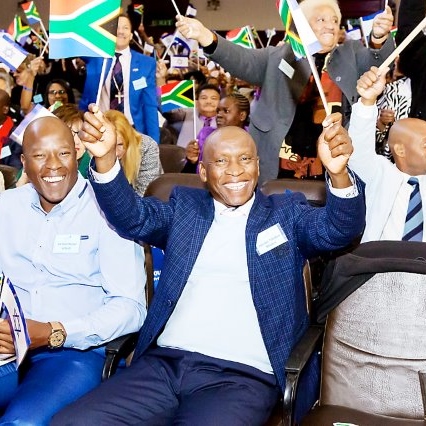
SA

SAFI calls on South Africans to speak out in support for Israel
JORDAN MOSHE
The conference brought together religious and political leaders and other representatives from across the spectrum.
Amid cries of “G-d bless Israel!” and “Viva Israel!”, the National Chairman of SAFI, Ben Swartz, mounted the stage of the Johannesburg City Hall with a clear message. “It’s time for us to stop being a silent majority in this country. We are here to show our support and make sure that we are heard.”
Among those present were Israeli Ambassador Lior Keinan; the President of the Council of Churches of South Africa, Archbishop Mbulelo Mvubu; Reverend Kenneth Meshoe, the founder and Chief Executive of Innovation Africa Sivan Ya’ari; Municipal Council Minister Dr Mpho Phalatse; and several others.
When Chief Rabbi Dr Warren Goldstein stood up to speak, many in the audience were visibly moved, rising from their seats and declaring him “our own Moses”.
“When Joshua assumed leadership of the Jewish people,” said Goldstein, “G-d delivered these words to him: ‘Be strong and courageous’. These words apply not only to Joshua, but to us here as well. We are blessed with strength and courage to stand up and make our voices heard in support of Israel.”
The need for courage was further emphasised by Israeli Ambassador Lior Keinan. After outlining the innumerable successes Israel had achieved in the space of only seventy years, Keinan said that the challenges faced by supporters of the state still lay ahead.
“The BDS threatens us regularly,” he said. “They threaten to demonstrate at any event we host, looking to disrupt it, and prevent it from going ahead. They even threatened to protest outside this conference here today, but we went ahead, and made sure our voices were not silent!”
Expressing contempt for the BDS, church pastors in attendance rose in indignation and yelled, “Laat hulle kom! Devils! Sinners! Who do they think they are? Let them come here and challenge us!”
There were continued outbreaks of vocalised sentiment as the morning progressed. With a Tanach in hand, the Deputy Director General of Maccabi World Union, Rabbi Carlos Tapiero, swept across the stage making it clear that the right of the Jewish people to the land of Israel could not be contested.
“Those who don’t understand this understand nothing!” he declared. “The Bible is recognised internationally as a credible text, and it says time and again that the connection of the Jewish people to Israel is one no one can challenge.”
Referring to countless textual examples, Tapiero proved the point again and again, stressing the significance of this connection to the Christian faith. “If you are a Christian, you understand this connection, and need to do something to protect it,” he said. “Because if the connection is contested, if the Temple Mount is conserved as not Jewish, the connection of Jesus to the land himself is being denied, and your religion is being kidnapped.
“History cannot be refuted with lies. Your government needs to understand that if they continue to do so, they are going to lose you and their Jewish constituents because they are meddling with something they don’t actually understand.”
“The term used to describe the Palestinian-Israeli conflict is the ‘Middle East conflict’,” he said. “Are we nuts? What about Iran, Syria, Sudan, and others? Are the conflicts in which they are involved not far worse and more devastating? Israel is trying to make peace, and its efforts are described as the ‘Middle East conflict’? This is ridiculous.”
Tapiero said that the real work lay ahead, and that this conference was not enough. “If after this conference you leave feeling some inspiration, you need to go further! We need and want peace. We need and want to create a bridge between South Africa and Israel. This is what we must tell the government.”
Offering words of a different kind, Sivan Ya’ari spoke about her involvement on the African continent sharing Israeli innovation with those in need. The Chief Executive and founder of Innovation Africa, Ya’ari was born in Israel to uneducated parents, and knows something about struggling to make ends meet.
At the age of twenty, she went looking for a job, and because she spoke French, was offered a position with Jordache Jeans at its Madagascar plant. It was her experience there that made her realise the extent of poverty in the Southern hemisphere. “I discovered that people there aren’t able to send their children to school,” she says, “The children are too ill and malnourished to learn. Moreover, they have no electricity. Nurses could not administer vaccinations because they had no facilitates to store them.
“As many as 620 million people live without electricity in sub-Saharan Africa. I wanted to help them, but I myself was uneducated and needed to learn how. I attended Columbia University, got a Master’s degree in energy, and discovered that a simple solution consisting of two solar panels can bring much needed energy to an entire village.
“If you look at the sun, you see a source of energy right above you,” she says. “If we harness this, we can achieve so much. One hundred and fifty villages in Africa have now got electricity, and with it, the ability to pump water. In 1957, Golda Meir visited Ghana. When she saw the challenges the country faced, she offered Israel’s help despite the country being only seven years old. Israel always wants to help where it can, and this is what I do.”
Thanks to her energy, innovation, and determination, one million impoverished people across Africa now have access to water and energy. Ya’ari stressed that this was not enough. She plans to reach six million people in the coming years. “Our work has been recognised by the United Nations, and so the contribution that Israel makes and continues to make to humanity cannot be denied. I am proud of this.”




